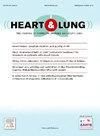Sex-based long-term outcome for atrial fibrillation patients post catheter ablation
IF 2.6
4区 医学
Q2 CARDIAC & CARDIOVASCULAR SYSTEMS
引用次数: 0
Abstract
Background
Previous studies have demonstrated sex-based disparities in atrial fibrillation (AF) recurrence and procedural complications post-catheter ablation among female patients; however, sex-specific long-term outcomes remain insufficiently characterized.
Objectives
This study aimed to evaluate long-term outcomes of AF recurrence and major adverse cardiovascular/cerebrovascular events (MACE) after catheter ablation, with the objectives of identifying sex-specific risk factors and providing evidence for personalized clinical strategies.
Methods
We conducted a retrospective analysis using data from a prospectively observational registry of AF ablation procedures at our institution from 2015 to 2020. Patients were followed up for MACE and AF recurrence. The risk factors of AF recurrence and MACE were further explored.
Results
The cohort comprised 2293 patients (62.8 % male; 37.2 % female) with a median follow-up of 50.36 months. Female patients demonstrated significantly higher AF recurrence rates compared to males (HR 1.305, 95 % CI 1.101 to 1.547; p = 0.0014), a disparity consistent across early (<1 year from diagnosis) and late ablation subgroups (both p < 0.05). In contrast, MACE incidence did not differ by sex (p = 0.23). Multivariable analysis identified female sex (adjust HR 1.358, p = 0.003), diabetes mellitus (HR 1.413, p = 0.005), and left atrial diameter ≥40 mm (HR 1.356, p = 0.001) as independent predictors of recurrence
Conclusions
Sex differences significantly impact the long-term outcomes of AF recurrence, but not MACE rates post-catheter ablation. The study highlights the necessity to integrate sex considerations into AF management strategies.
房颤患者导管消融后基于性别的长期预后
背景先前的研究表明,女性患者房颤(AF)复发和导管消融后的手术并发症存在性别差异;然而,性别特异性的长期结果仍然没有充分的特征。目的本研究旨在评估房颤复发和导管消融后主要心脑血管不良事件(MACE)的长期结局,目的是确定性别特异性的危险因素,为个性化的临床策略提供证据。方法:我们对我院2015年至2020年房颤消融手术的前瞻性观察登记数据进行回顾性分析。随访患者MACE及房颤复发情况。进一步探讨AF复发及MACE的危险因素。结果该队列共纳入2293例患者,其中男性62.8%;37.2%女性),中位随访时间为50.36个月。女性患者的房颤复发率明显高于男性(HR 1.305, 95% CI 1.101 ~ 1.547;P = 0.0014),在早期(诊断后1年)和晚期消融亚组(P <;0.05)。相反,MACE的发生率没有性别差异(p = 0.23)。多变量分析发现,女性(调整HR 1.358, p = 0.003)、糖尿病(调整HR 1.413, p = 0.005)和左房直径≥40 mm(调整HR 1.356, p = 0.001)是房颤复发的独立预测因素。结论:性别差异显著影响房颤复发的长期结局,但对导管消融后的MACE率没有影响。该研究强调了将性别因素纳入房颤管理策略的必要性。
本文章由计算机程序翻译,如有差异,请以英文原文为准。
求助全文
约1分钟内获得全文
求助全文
来源期刊

Heart & Lung
医学-呼吸系统
CiteScore
4.60
自引率
3.60%
发文量
184
审稿时长
35 days
期刊介绍:
Heart & Lung: The Journal of Cardiopulmonary and Acute Care, the official publication of The American Association of Heart Failure Nurses, presents original, peer-reviewed articles on techniques, advances, investigations, and observations related to the care of patients with acute and critical illness and patients with chronic cardiac or pulmonary disorders.
The Journal''s acute care articles focus on the care of hospitalized patients, including those in the critical and acute care settings. Because most patients who are hospitalized in acute and critical care settings have chronic conditions, we are also interested in the chronically critically ill, the care of patients with chronic cardiopulmonary disorders, their rehabilitation, and disease prevention. The Journal''s heart failure articles focus on all aspects of the care of patients with this condition. Manuscripts that are relevant to populations across the human lifespan are welcome.
 求助内容:
求助内容: 应助结果提醒方式:
应助结果提醒方式:


